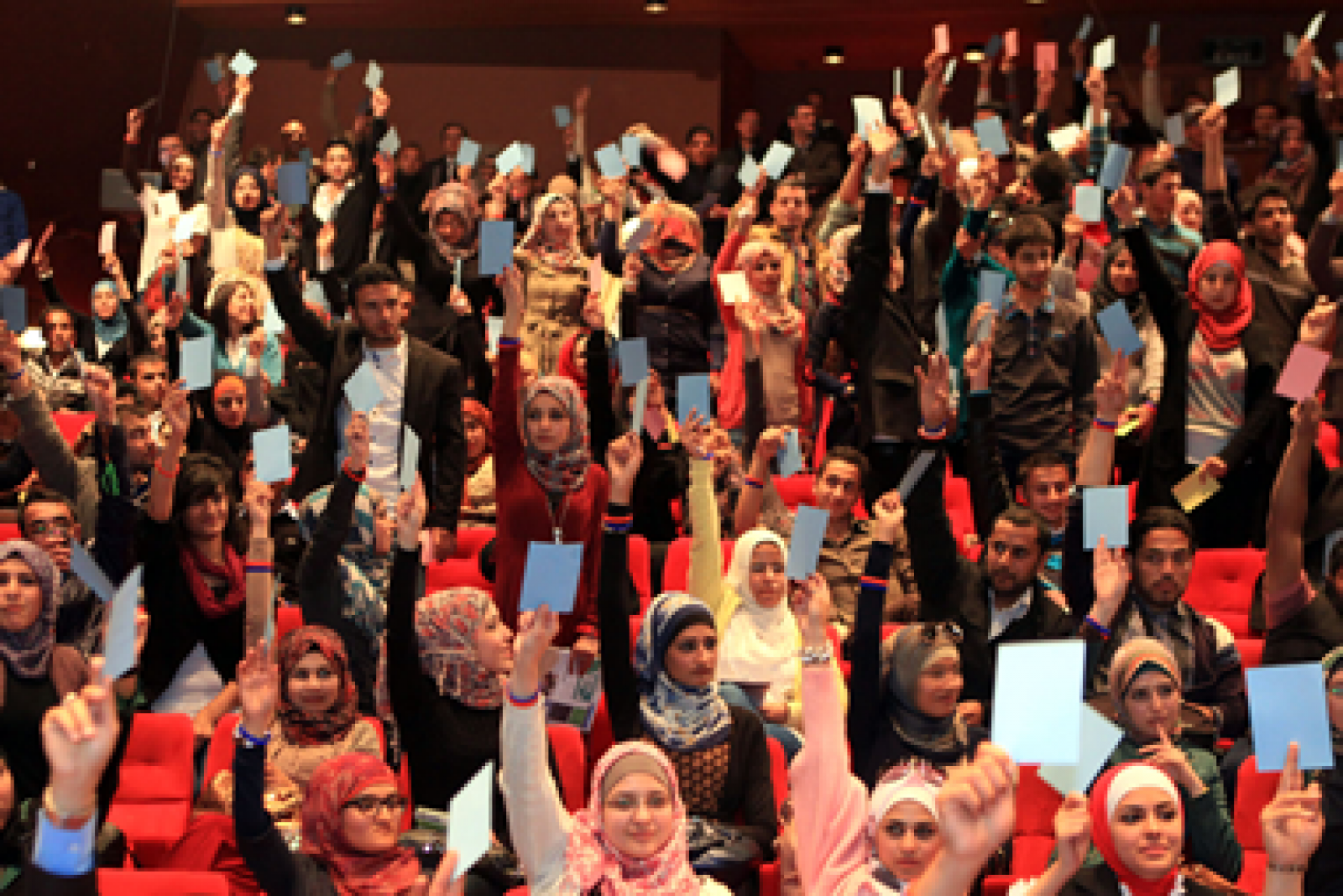
SHARE
The setting was a hall in Amman, Jordan, packed with more than 500 students from eight universities, members of the community, and a panel of judges representing members of parliament, civil society organizations, university officials and veteran journalists. They were there for the culmination of five weeks of debate practice and training. Over the next four hours, they would watch eight teams debate seven topics ranging from lowering the age of candidacy for parliament to receiving Syrian refugees in Jordan. At the end, only one team would be left standing.
The topic for the final two teams was whether political parties should be allowed to operate inside university campuses. The audience was nearly unanimous in choosing the team from Yarmouk University of Irbid, Jordan, which argued in favor of allowing political parties to operate on campuses, and subsequent votes from the judges gave that team the win.
The eight teams were nominated to participate in the national debate competition as part of Usharek+, NDI’s advanced student participation program, which has trained approximately 250 Jordanian university students in advocacy and debate skills. The competition was the first ever held in Jordan, where 75 percent of the population is under 35 and where there is little culture of debate.
“We hope these debates encourage the young people of Jordan to be aware of the challenges facing the country, and enable them to articulate their views effectively in the future,” said Beth S. Paige, mission director in Jordan for the U.S. Agency for International Development.
The Usharek+ participants first began developing their skills during an
Ana Usharek reaches more than 2,500 students through bi-monthly discussion groups focused on the basic principles of democracy and human rights. The students meet with decision-makers and members of parliament in roundtable and town hall meetings, and visit local organizations to discuss issues ranging from last January’s parliamentary elections to recent political and economic reform measures.
Many graduates of Ana Usharek have gone on to take part in Usharek+, attending training sessions on advocacy and debate skills. They draft publications — such as “Meet the National Lists,” in which students interviewed and profiled parliamentary candidates ahead of the 2013 elections, and “Meet the MPs,” which included profiles of 40 members of parliament — and organize debates among students and candidates.
 The winning team of NDI's National Student Debate Competition in Amman, Jordan.
The winning team of NDI's National Student Debate Competition in Amman, Jordan.Since the first national debate, Usharek+ students have appeared on television to discuss the debate skills they’ve acquired and have interned with civil society organizations focusing on political issues and environmental concerns.
Some students have gone on to further debate competitions. A group from Yarmouk University appeared in a debate sponsored by BBC Arabic with teams from neighboring countries, including Lebanon and Egypt. Other Usharek+ students appeared on national television to talk about the program; three Balqa University students discussed their week-long internship on a water harvesting project, while two Hashemite University students appeared on television to discuss their experience organizing a debate between members of parliament and the community.
The Hashemite students noted that their work has promoted dialogue between elected officials and their constituents. They said they were glad to serve as that link.
Ana Usharek and Usharek+ are funded by the U.S. Agency for International Development's Consortium for Elections and Political Process Strengthening (CEPPS) program.
Read more:
- Jordanian Elections Show Marked Improvement from Past Polls but Shortcomings Remain, NDI Delegation Finds»
- Upcoming Jordanian Elections Marked by Widespread Apathy, NDI Delegation Finds»
- International Network Shares Techniques for Organizing Candidate Debates»
Published Aug. 1, 2013
Updated Aug. 27, 2013


